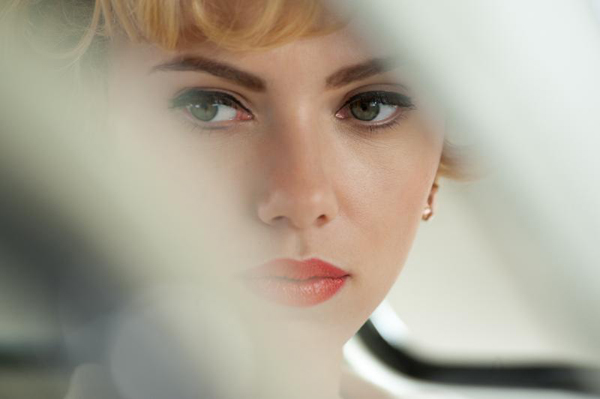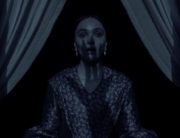
Scarlett Johansson as Janet Leigh (Suzanne Tenner/Fox Searchlight Pictures)
Hitchcock looks at what it took for British director Alfred Hitchcock to make arguably the first and most innovative “slasher” film, Psycho (which he made at the young age of 60, no less), in the context of his working and emotional relationship with his wife/collaborator of many decades, Alma Reville. (Anthony Hopkins and Helen Mirren play husband and wife.) This marriage also appeared in the recent HBO movie The Girl, only there Alma was more marginalized (sadly, in retrospect) as it focused more on Hitch’s obsessive relationship with actress Tippi Hedren. The flaws of that film become more apparent (flat writing, a not-totally-there performance from Sienna Miller as Hedren) when compared to Hitchcock. I wish I could say Hitchcock is far and away better, but it is only up to a point.
It’s satisfying to see that Sacha Gervasi, following up on his rip-roaring, emotionally bittersweet and big-hearted documentary Anvil! The Story of Anvil, transitions into narrative film with a topnotch cast. Hopkins physically transforms into the droll but deadly serious filmmaker, and only in a few times does his voice slips back into sounding like Hopkins. Mirren (ravishing at 60-something, especially in a red bathing suit) never ceases to amaze, but watch out for when Alma’s determined—or angry. She practically makes the film as watchable as it is. Scarlett Johansson plays the genuinely nice, perky and, at times, terrified Janet Leigh, who stars as Psycho’s shower victim Marion Crane. James D’Arcy captures perfectly the awkwardness of Anthony Perkins. Jessica Biel is better than she usual (which is to say, bland) as the beleaguered actress Vera Miles, and Michael Stuhlbarg has a few good scenes as agent Lew Wasserman.
The details of what it took to get Psycho made could be a movie all unto itself, from the controversy over a flushed toilet being shown—the first seen in any American film—to the censorship fight over the nudity and violence. (The production was paid out of Hitch’s pocket). The film has actually two story lines, with a third subplot. The conflict arises, simplistic as it might be, when Alma has a writing diversion (maybe the first, as Alma points out, since she started working with her husband in the 1920s) co-writing with screenwriter Whitfield Cook (Danny Huston). Hitch, a hopeless voyeur (duh), is suspicious of the time she spends with Mr. Cook, who obviously flirts with Alma. Here there’s psychological intrigue, though two dimensional.
The compelling side of this telling of their marriage—in sharp contrast with the depiction in The Girl—is that we actually see a full relationship here. Perhaps that was a point in the earlier film, how estranged the director was from his wife, but in that case it made Hitch less human and more of a horny monster against Tippi Hedren. Hopkins plays Hitch as a man imposing but also, contradictorily, small in his insecurities. Unlike in the HBO film, where Hitchcock came off mostly as a creep, this Alfred, while flawed, is sympathetic to a great degree, as is Alma. Hitchcock also conveys his directing style, though this isn’t really a huge focus in the film.
The third story is the most unnecessary, involving Ed Gein, who served as the loose inspiration for the Robert Bloch book that Psycho was based on. (Screenwriter Joseph Stefano (Ralph Macchio) says he’s the most qualified for this adaptation gig because he dreams about his mother, oh-oh.) Gein (Michael Wincott) pops up as a story device, whom Hitch talks to in his dreams or in his imagination in moments perhaps meant to vaguely (or obviously) reveal Hitch’s obsessions with murder. Gein could’ve been cut out of the film and not much would have been lost, while at the same time more juicy factoids about the making of the film are missing (like Saul Bass’ involvement in the shower sequence and the point of contention that he directed it himself). But, hey, there’s the IMDb facts page of Psycho and Hitchcock. One may take longer, but it’s a lot more fun.
















Leave A Comment